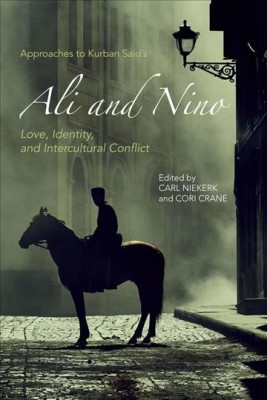| Approaches to Kurban Said's Ali and Nino: Love, Identity, and Intercultural Conflict Contributor(s): Niekerk, Carl (Editor), Crane, Cori (Editor), Haensch, Anja (Contribution by) |
|
 |
ISBN: 1571139907 ISBN-13: 9781571139900 Publisher: Camden House (NY) OUR PRICE: $109.25 Product Type: Hardcover Published: June 2017 |
| Additional Information |
| BISAC Categories: - Performing Arts | Film - Direction & Production - Performing Arts | Film - History & Criticism - Literary Criticism | European - French |
| Dewey: 833.912 |
| LCCN: 2017008223 |
| Series: Studies in German Literature Linguistics and Culture |
| Physical Information: 0.81" H x 6" W x 9" (1.31 lbs) 288 pages |
| Themes: - Cultural Region - French |
| Descriptions, Reviews, Etc. |
| Publisher Description: Ali and Nino is a novel published in German in 1937 under the alias "Kurban Said," a love story between a Muslim man and a Christian woman set in Baku, Azerbaijan, during World War I and the country's brief independence. Itwas a major success, translated into several other languages, but was forgotten by the end of World War II. Recent research by the journalist Tom Reiss has revealed the identity of the author as Lev/Leo Nussimbaum (1905-1942), aJewish man born in Baku who converted to Islam, worked as a journalist in Berlin, and died forgotten in exile. Reiss's discovery has spurred new interest in the novel, as has the fact that the book prefigures today's perceived conflicts between East and West or Islam and Christianity, but also suggests a more peaceful model of intercultural living in multiethnic Baku's melting pot of Islam, Judaism, and Christianity. The present volume collects twelve newessays on different aspects of the text by scholars from a variety of disciplines and cultural backgrounds. It is intended to showcase the suitability of Ali and Nino for inclusion in a curriculum focused on German, world literature, or area studies, and to suggest a variety of approaches to the novel while also appealing to its fans. Contributors: Sara Abdoullah-Zadeh, Cori Crane, Chase Dimock, Christine Rapp Dombrowski, Elizabeth WeberEdwards, Anja Haensch, Kamaal Haque, Lisabeth Hock, Ruchama Johnston-Bloom, Carl Niekerk, Elke Pfitzinger, Soraya Saatchi, Daniel Schreiner, Azade Seyhan. Carl Niekerk is Professor of German with affiliate appointmentsin French, Comparative and World Literature, and Jewish Studies at the University of Illinois at Urbana-Champaign. Cori Crane is Associate Professor of the Practice and Director of the Language Program in the Department of Germanic Languages and Literature at Duke University. |
Contributor Bio(s): Niekerk, Carl: - Carl Niekerk received his PhD from Washington University in St. Louis and is currently Professor of German with affiliate appointments in French, comparative and world literature, and Jewish studies at the University of Illinois at Urbana-Champaign. Since 2016, he is the editor of The German Quarterly and, since 2012, a co-editor of the Lessing Yearbook/Jahrbuch. He is the author of Reading Mahler: German Culture and Jewish Identity in Fin-de-Siecle Vienna (Rochester, NY: Camden House, 2010; second edition [paperback] 2013) and books on Georg Christoph Lichtenberg and J. W. von Goethe. His teaching and research interests include the Radical Enlightenment, early anthropology, German- and Austrian-Jewish cultural history, psychoanalysis and culture, colonialism and postcolonialism, world literature, and comparative Dutch studies.Crane, Cori: - Cori Crane received her PhD from Georgetown University and is currently Associate Professor of the Practice and Director of the Language Program in the Department of Germanic Languages and Literature at Duke University. From 2012 to 2017 she served as Assistant Professor of Germanic Studies at the University of Texas at Austin, and from 2004 to 2012 as the German Language Program Director at the University of Illinois at Urbana-Champaign. Her areas of research focus on second language writing, curriculum development, and foreign language pedagogy. She has published on pedagogical and curricular models, genre theory, and language teacher education. Currently, she is co-writing a book on the development of narrative writing across undergraduate foreign language curricula from a systemic functional linguistic perspective. |